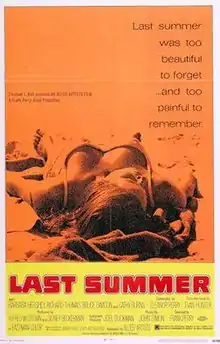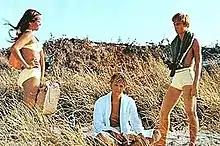Last Summer
Last Summer is a 1969 coming-of-age film about adolescent sexuality[3] based on the 1968 novel Last Summer by Evan Hunter. Director Frank Perry filmed at Fire Island locations. The stars of the film are Catherine Burns, Barbara Hershey, Bruce Davison and Richard Thomas. The memorable performance by Burns brought her a nomination for an Academy Award for Best Supporting Actress, and she won a Kansas City Film Critics Circle Award.
| Last Summer | |
|---|---|
 Theatrical Poster | |
| Directed by | Frank Perry |
| Written by | Eleanor Perry |
| Based on | Last Summer by Evan Hunter |
| Starring | Barbara Hershey Richard Thomas Bruce Davison Catherine Burns |
| Music by | John Simon |
| Cinematography | Enrique Bravo Gerald Hirschfeld |
| Edited by | Sidney Katz Marion Kraft |
Production company | Alsid Productions |
| Distributed by | Allied Artists |
Release date |
|
Running time | 97 minutes |
| Country | United States |
| Language | English |
| Budget | $780,000[1] |
| Box office | $3 million (rentals)[2] |
Plot
While spending the summer on Fire Island, Peter and Dan, two adolescent boys from upper-middle-class families, meet Sandy, a young girl who has found a wounded seagull on the beach. After the boys remove a fishhook from the bird's throat, the three youngsters become fast friends and spend all their time together, swimming, boating, smoking marijuana and cautiously experimenting with their awakening sexual impulses during visits to a movie house on the mainland.
One afternoon they are joined by Rhoda, a plump 15-year-old who is anxious to make friends. When the boys discover that Sandy has brutally killed the gull for biting her, Peter begins to shift his attention to Rhoda. Finding it fun to taunt Rhoda about her inexperience with boys, Sandy gets Peter and Dan to persuade the reluctant Rhoda to take her place, and all four go to a restaurant to meet the shy Puerto Rican, Anibal.
To Rhoda's embarrassment, Sandy, Dan, and Peter get the man drunk and abandon him to three local bullies. Although Rhoda rebukes Peter for his behavior, she succeeds only in alienating him, and he goes off with Sandy and Dan for a picnic in the woods. Dan's plan of proving his manhood to Sandy is ruined when Rhoda tags along.
Irritated by Rhoda's intrusion into their clique, Sandy removes her bikini top and dares Rhoda to do the same. Disgusted, Rhoda tries to leave, but Sandy goads the boys into holding her back. The frightened girl appeals to Peter for help, but he joins Sandy in pinning Rhoda to the ground while she is savagely raped by Dan. Following the assault, the three leave; Sandy and Dan return to the beach while Peter hesitates on a sand dune near Rhoda.
Cast
- Richard Thomas as Peter
- Bruce Davison as Dan
- Barbara Hershey as Sandy
- Catherine Burns as Rhoda
- Ernesto Gonzalez as Anibal
Production notes

- Eleanor Perry's screenplay was based on the novel by Evan Hunter, published in hardcover by Doubleday (1968) and paperback by Signet (1969).
- The character of Dan was originally called David in the book but was changed for the film.
- The accidental breaking of a seagull's neck during filming affected Barbara Hershey sufficiently for her to change her surname to Seagull for a couple of years.[4]
- Sondra Locke was offered the role of Sandy, but turned it down.
- Ralph Waite played father to Richard Thomas in this movie, then went on to play his father again in The Waltons.
- The film takes place almost entirely on Fire Island, a long sandbar off Long Island with the Atlantic Ocean on one side, the Great South Bay on the other, and upper-class summer homes built on its beaches and dunes.
- Evan Hunter, author of the source novel, wrote a sequel novel, which he titled Come Winter, in 1973.[5] Hunter was working on the screenplay of Come Winter; however, it was never filmed.
- Last Summer was one of a handful of high-profile X-rated movies that were released in 1969 along with the Oscar-winning best picture Midnight Cowboy and Haskell Wexler's docudrama Medium Cool.[6]
- First given an X rating when it was first submitted to the MPAA due to the scene that depicted Rhoda's rape, it was then edited down to an MPAA R-rating shortly after its initial theatrical release, with the cut version still containing nudity and strong language. When the film is transmitted occasionally on television, a further-censored PG-rated version is presented which cuts out all nudity and heavily edits the scene of Rhoda's rape. The R-rated version is the one seen in the VHS videotape release. The film is not available on DVD, nor is the original X-rated version.
- All original 35mm prints of the film were lost for years. In 2001, a 16mm print was located at the National Film and Sound Archive of Australia after a two-year search and was brought to Los Angeles. Apparently it was the only surviving film version of the movie. The film had a rare showing in 2012 in Los Angeles.[6]
Soundtrack
The film had a soundtrack album (Warner Bros.-Seven Arts WS 1791) of the score composed by John Simon and Collin Walcott. Heard on the soundtrack: John Simon (piano), Collin Walcott (sitar, tamboura), Aunt Mary's Transcendental Slip and Lurch Band (rock band), Cyrus Faryar (voice), Buddy Bruno (voice), Ray Draper (tuba, voice), Electric Meatball (rock band), Henry Diltz (banjo, voice), Bad Kharma Dan and the Bicycle Brothers (motorcycle gang). Rick Danko, Levon Helm and Richard Manuel of The Band played on the soundtrack as well, but were uncredited due to having had a contract on another record label.
Reception
The film received positive reviews.[3][7] Roger Ebert gave the movie 4 stars, writing:
From time to time you find yourself wondering if there will ever be a movie that understands life the way you've experienced it. There are good movies about other people's lives, but rarely a movie that recalls, if only for a scene or two, the sense and flavor of life the way you remember it.
Adolescence is a period that most people, I imagine, remember rather well. For the first time in your life important things were happening to you; you were growing up; what mattered to you made a difference...[On] top of the desire to be brave and honorable, there was also the compelling desire to be accepted, to be admitted to membership in that adolescent society defined only by those excluded from it...
Frank Perry's "Last Summer" is about exactly such years and days, about exactly that time in the life of four 15-or-16-year-old adolescents, and it is one of the finest, truest, most deeply felt movies in my experience.[8]
See also
References
- "Frank Perry Discussion". The Criterion Collection. Retrieved August 22, 2016.
- "Big Rental Films of 1969", Variety, 7 January 1970, pg 15.
- Canby, Vincent (June 11, 1969). "Last Summer (1969) Screen: 'Last Summer':Cinema I Film Brings Trio of Newcomers". NYTimes.com. New York Times.
- Forsberg, Myra (March 29, 1987). "FILM; BARBARA HERSHEY: IN DEMAND".
- "Come Winter by Evan Hunter (1973)". Constable & Robinson.
- King, Susan (January 18, 2012). 'Last Summer' to have rare screening from American Cinematheque, Los Angeles Times.
- "Last Summer (1969)". FilmFanatic.org. Retrieved 14 May 2008.
- Ebert, Roger (August 15, 1969). "Last Summer (1969)". RogerEbert.com. Chicago Sun-Times.
External links
- Last Summer at IMDb
- Last Summer at the TCM Movie Database